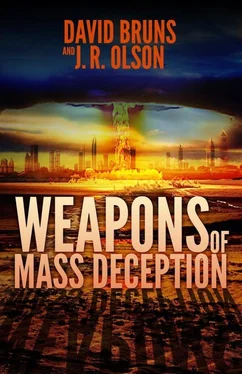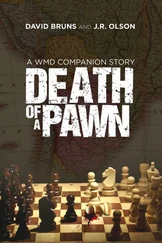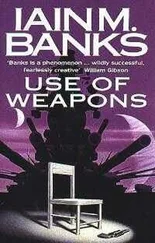He nearly dropped his soda.
He’d seen this knife before. In Iraq. The Iranian diplomat that Brendan had picked up back in 2007 had been carrying it.
Using his CIA login, he called up the data from the raid. Clem would have a kitten if he found out Don had bypassed the RFI process — which he wouldn’t approve in the first place — but Don could feel that he was on the verge of a breakthrough. There was a connection between Liz’s report and that raid. Somewhere in this puzzle was the magic link he needed to make all the pieces fit together. He just needed to keep looking.
He scanned through the folder. They’d uncovered a major weapons cache, including the source of the more sophisticated EFPs that were just showing up in the region. The explosives were of Iranian origin and the technology impressive, especially for local militia. These guys obviously had advanced training.
He pulled up the digital photos from the raid, tapping the cursor until he found the one he was looking for. The knife was in someone’s flat palm. It had a curved white handle and a short arced blade, wrought with filigree designs. The next picture showed a crushed pack of Marlboros and a silver Zippo lighter.
He scanned the text of the after-action report from Brendan. The Iranian diplomat’s bodyguard had been killed in the raid. How important did you have to be to rate your own bodyguard?
Don pulled up the picture page of the Iranian diplomat’s passport next to the photo of the ivory-handled knife and focused on the man’s face. A classic face, with a noble nose, steady dark eyes, and thin lips set in a cruel smile.
Alizera Mogadaham, who are you?
He flipped back to the text from Liz’s report. What about the blade? That was what the Farsi-speaking prisoner had asked.
The puzzle pieces in Don’s mind snapped together: They weren’t talking about a weapons system, they were talking about a person .
And now Don had his picture.
Somewhere in the Zagros Mountains, south of Gerash, Iran
06 June 2010 — 0200 local
Hashem paused the Range Rover on the top of the rise and flashed the headlights three times, leaving them off after the final flash.
He stared at his watch, letting the second hand sweep around the face twice. Two flashes poked out of the darkness.
The sign for all clear.
Hashem turned his lights back on and put the car in drive. The chains he dragged behind the Rover to obliterate his tracks in the sand rattled gently as he pulled forward. Satellite imagery of the area was unlikely, but one could never be too careful.
It amazed him how much these desert drives relaxed him. He barely glanced at the GPS monitor on the dashboard. When he first began to make the treks into the desert, he’d always taken a security detail of two or three. Then it was just Delir — he paused at the memory of his driver. Now he preferred to make the drive alone.
He’d come to the secret cave so many times over the years he could find his way even in the dark. But it was good to have a backup plan. He smiled to himself. He could hear his brother’s voice in his head: “Always the cautious one, brother.”
And his trademark response: “The cautious ones keep their heads, Aban.”
He descended down a steep rock slope onto a flat valley floor, the last stretch of road before he reached the cave. Hashem shifted in his seat to ease the tightness in his back. There was a shorter path into the secret base, one that stayed to the lowland flat stretches and was used for bringing in supplies or heavy equipment. His security forces normally kept it blocked with heavy boulders to discourage unwanted visitors. He could have had them unblock the access road, but it was a point of pride with Hashem to follow the same security protocols he demanded of his men.
He kept his speed low, giving his men plenty of time to scan his vehicle for heat signatures, verifying he was alone. Hashem always felt a rush of nostalgia when he pulled into the entrance of the cave. The delicate hood of rock extended out over the sand, blocking the stars from his view.
When he and Aban and their father had first found this cave, it had looked to them like just another of the hundreds of ancient lava tubes littering the area, extending back into the mountain ten or twenty meters until deadending in a blank wall. But this one kept going. The three of them had gotten out their headlamps and crawled on their hands and knees the last ten meters — Hashem remembered fearing they would crawl into a nest of snakes — until the cave expanded into a vast cavern. They’d shouted and called into the darkness, and Aban lit a flare.
The cave was a vast complex of linked caverns that extended three hundred meters in either direction, with a source of fresh water and links to the outside world for fresh air.
Hashem parked the vehicle in front of the gunmetal gray steel doors that covered the entrance now. The blackout screen lowered behind the Rover, shutting out the dim desertscape in his rearview mirror. He closed his eyes, trying to preserve that memory for a few more seconds. It had all been perfect then, the three of them exploring the natural beauty of this underground wonderland.
It had all gone so wrong after that.
The light from the opening doors reddened his closed eyelids. He opened his eyes and put the Rover in drive.
His father and brother would not recognize the cave today. Gone was the warren of caverns, replaced by a floor hewn smooth by the chisels of his stonemasons. Pillars of steel sprouted out of the bedrock and lined the walls in weak areas. Over the course of three years, Hashem had brought in over two hundred immigrant laborers — Bangladeshis, Pakistanis, North Africans, wherever he could find desperate men who would work without asking questions.
They never returned to their families, of course. The next of kin did receive a handsome stipend from an anonymous donor, but their loved one never came home. Eventually, the men figured it out, and a few tried to escape. Three even made it to the open desert, but Hashem’s men assured him they would never survive the harsh environment to reach civilization. But most never complained. It amazed Hashem how many men simply accepted their fate.
A golf cart and driver waited next to where Hashem parked his Rover. He returned the salute, dropped his duffel bag in the cargo space, and slid across the vinyl seat. The driver pulled off immediately, racing around the perimeter of the cavern. They paused at the barracks, where Hashem changed from civilian clothes to a dark blue jumpsuit, the uniform of his operation. The only adornment to the uniform was a belt which held a radiation monitor.
He splashed water on his face and closed his eyes again. His room, barely the size of his walk-in closet in Tehran, consisted of a bed, a desk, a washstand, and a small prayer rug on the floor, but it felt more like home than any house he’d ever owned.
He dried his face and rejoined the driver on the golf cart. “Take me to Yusef.”
* * *
Yusef Kharmanian looked up from the video screen as Hashem entered his workbay. Wild locks of unruly black hair and a thick black beard framed his face.
It had taken Hashem a long time to adjust to Yusef’s eyes. One solid black pupil stared at him intently, burning with passion. The other eye wandered as he spoke, first seeing Hashem’s shoes, then over his shoulder, then the ceiling. Hashem smiled at Yusef; after nearly three years, the wandering eye didn’t bother him anymore.
“What present did you bring me on this trip, Colonel?” The young man’s voice was surprisingly soft, and he had a lopsided smile to match his uneven eyes.
Читать дальше












